How to Ask and Answer 'How Are You?' in Spanish: A Simple Guide
How Are You in Spanish PLUS Positive,
Neutral and Negative Responses

Learning how to ask and respond to “How are you?” in Spanish is one of the most useful skills for building connections with Spanish speakers.
In this guide, we’ll explore common phrases like ¿Cómo estás? (how are you) and how to ask this question in more casual or formal ways.
We’ll also learn how to answer and learn words related to emotions and useful phrases you can deploy in daily Spanish conversation.
Muy bien, gracias. ¿Y tú?Very well, thank you. And you?
Ahí voy, no me quejo.I’m hanging in there, can’t complain.
By the end, you’ll be ready to make a great impression in any conversation!
Let’s learn how to ask and answer ‘How Are You?’ in Spanish
How Are You and Responses || The Basic How Are You in Spanish and Expected Responses
How Are You and Responses || Other Forms of Saying How Are You in Spanish
How Are You and Responses || Positive, Negative, and Neutral Responses
How Are You and Responses || Quiz
How Are You and Responses || FAQs
How Are You and Responses || The Basic How Are You in Spanish and Expected Responses
In Spain, by far, the most common way of asking someone “How are you?” is:
¿Cómo estás?
This phrase can be a mere formality or an actual sincere form of inquiring into someone’s well-being.
A tip to consider: When using ¿Cómo estás? in a more formal context, always substitute tú (informal you) for Usted (formal you) and conjugate the verb accordingly, like so:
¿Cómo está Usted? or simply ¿Cómo está?
When used as an introductory phrase:
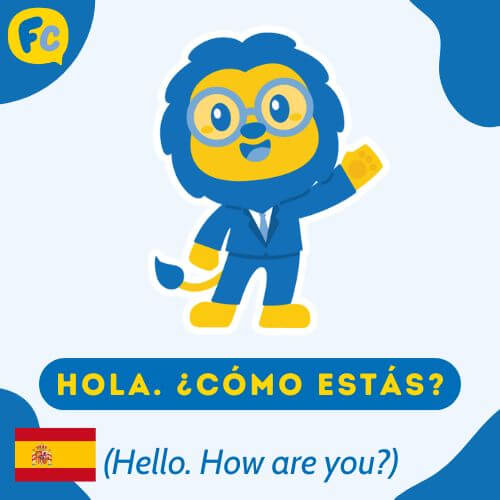
| Expression | Translation | Formality Level |
|---|---|---|
| ¿Cómo está Usted? | How are you? | Formal |
| ¿Cómo estás? | How are you? | Neutral |
| ¿Qué tal? | How are you? | Casual |

Your Comprehensive Guide to 159 Reflexive Verbs in Spanish
Reflexive Verbs in Spanish: When the Doer Becomes the Receiver 👉 Reflexive verbs in Spanish belong to the category of Pronominal verbs, so all reflexive verbs are pronominal, although not all pronominal verbs are reflexive. Pronominal verbs (in reference to…
And what to respond when ¿Cómo estás? or ¿Qué tal? is used as a pleasantry or a formality in a greeting? Here are some frequently used responses:
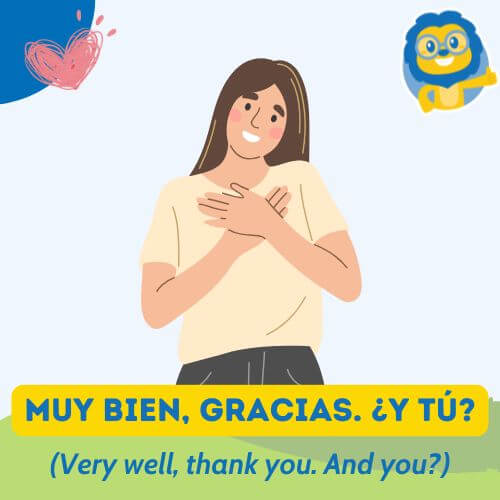
| spanish | english | Formality |
|---|---|---|
| Muy bien, gracias. ¿Y tú? | Very well, thank you. And you? | Casual/Informal |
| Todo bien, gracias. | All good, thanks. | Casual/Informal |
| Bien. ¿Y tú? | Good. And you? | Casual/Informal |
| Estoy bien, gracias. | I am well, thank you. | Neutral |
When used to inquire on someone’s well-being:
To add more meaning and intention to the question “How are you?”
going beyond a mere formality, here are some phrases you can resort to.
These are alternatives to the typical “¿Cómo estás?” which will still be considered correctly used in this given context.

| spanish | english | Context |
|---|---|---|
| ¿Cómo te encuentras? | How are you feeling? | Physical level |
| ¿Cómo te sientes? | How are you feeling? | Emotional level |
And what to respond to these inquiries about one’s wellbeing?
Here are some frequently used phrases you can use, depending on your physical or emotional state:
Estoy… (I am) + the emotional state.
For example: Estoy content hoy, es mi cumpleaños. (I am happy today, it’s my birthday.)
Here are some of the more widely used emotional or physical states you can resort to:
| spanish | english |
|---|---|
| contento/a | happy |
| triste | sad |
| enfadado/a | angry |
| nervioso/a | nervous |
| cansado/a | tired |
| agotado/a | exhausted |
| enfermo/a | ill |
| bien | well |
| mal | not well |
| sano/a | healthy |
| descansado/a | rested |
| estupendo/a | great |
| perfecto/a | perfect |
| somnoliento/a | sleepy |
How Are You and Responses ||
Other Forms of Saying How Are You in Spanish
If you want to steer clear of the basic forms of asking someone how they are (¿Cómo estás? and ¿Qué tal?), know that there are many other ways to inquire about someone’s wellbeing.
Many times, the basic forms can come across as formalities.
Here are some of the most commonly used ones, mostly used in an informal context.
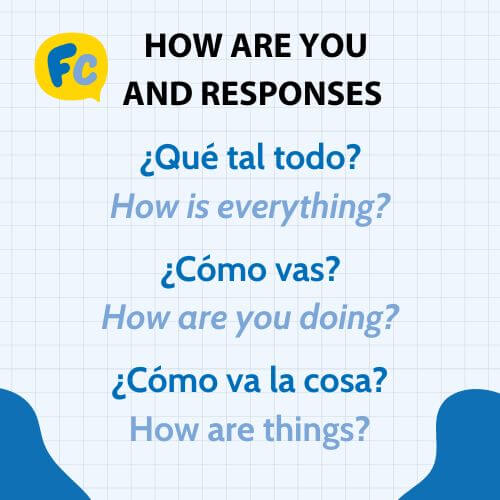
| spanish | english |
|---|---|
| ¿Qué tal todo? | How is everything? |
| ¿Cómo vas? | How are you doing? |
| ¿Cómo va la cosa? | How are things? |
| ¿Cómo te va? | How are things going for you? |
| ¿Qué hay? | What’s up? |
| ¿Qué hay de nuevo? | What’s new? |
| ¿Qué pasa? | What’s happening? |
| ¿Todo bien? | All good? |
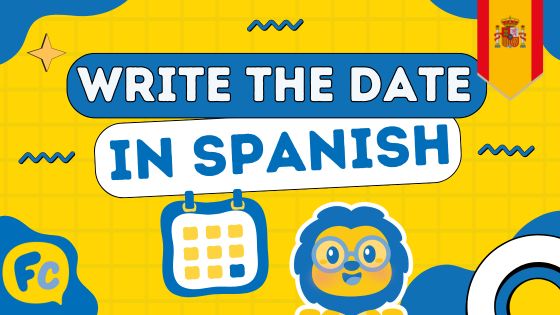
How To Write the Date in Spanish – Using the Proper Format
How To Write the Date in SpanishWhen To Use Digits, Words and Both! 📌 What is the date today? This is probably one of the most frequently asked questions you will get (and ask). So let’s prepare for that eventuality…
How Are You and Responses ||
Positive, Negative and Neutral Responses
Whether you are feeling good, upbeat, optimistic, or feeling rather down or just so-so and need to express it in Spanish, here are some of the most commonly used responses when asked ¿Cómo estás?:
Feeling positive?
| spanish | english | Example | meaning | |||
|---|---|---|---|---|---|---|
| Muy bien | Very good | Estoy muy bien, gracias. | I am very well, thank gb-speak-button Bien data-lang='es-ES'>PlayBien | Good | [speak Todo bien, gracias. ¿Y tú? | All good, thanks. And you? |
| Estupendo | Great | Me va estupendo todo. | Everything is going great for me. | |||
| Perfecto | Perfect | Sí, todo perfecto. | Yes, everything is perfect. | |||
| Fenomenal | Phenomenal | Fenomenal, gracias. | Phenomenal, thank you. | |||
| Ideal | Ideal/Perfect | Nos va todo ideal. | Everything is going perfectly for us. | |||
| Genial | Great | Todo genial, gracias. | Everything is great, thank you. |
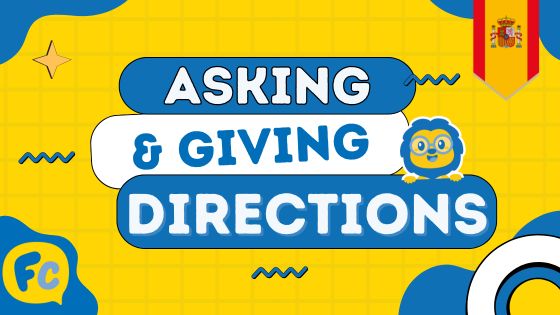
The Traditional GPS 🗺️ Asking for and Giving Directions in Spanish
Understanding Directionsin Spanish // Vocab and FREE QUIZ When travelling to a Spanish-speaking country, one of the most valuable skills you can have is the ability to ask for directions. Whether you’re exploring city streets, finding your way through a…
Feeling neutral, indifferent or non-committal?
| spanish | english | Example | meaning |
|---|---|---|---|
| Así así | So-so | Así así me van las cosas. | Things are going so-so for me. |
| Más o menos | More or less | Me encuentro más o menos. | I feel so-so. |
| Tirando | Getting by | Voy tirando. | I’m getting by. |
| Regular | Ok, but barely | Estoy regular estos días. | I am just ok these days. |
| Bah | Meh | Bah, he estado mejor. | Meh, I’ve been better. |
| Ahí voy | Hanging in there | Ahí voy, no me quejo. | I am hanging in there, can’t complain. |
How Are You and Responses || Quiz
Have you mastered the Spanish vocabulary on this page?
Whether you knew some (or all) of them before reading this article, or on the contrary just learnt a bunch of them, take our quick fire quiz to see how well you remember them.
👇 Have a try right now and get immediate results:
How Are You and Responses || FAQs
How to say ‘How are you in Spanish?’ in an informal way?
In Spain, the most common way of asking someone “How are you?” in Spanish is:
¿Cómo estás?
This is an all-around phrase that can be informal or formal, depending on the context, and can be a mere formality when being introduced to someone or an actual sincere form of inquiring into someone’s wellbeing.
Other more casual and informal phrases that are frequently used as well include:
¿Qué tal? (How are you?/How’s it going?)
¿Qué tal todo? (How is everything?)
¿Cómo vas? (How are you doing?)
¿Cómo va la cosa? (How are things?)
¿Cómo te va? (How are things going for you?)
¿Qué hay? (What’s up?)
¿Qué hay de nuevo? (What’s new?)
¿Qué pasa? (What’s happening?)
¿Todo bien? (All good?)
How to say ‘How are you in Spanish?’ in a formal way?
When in a formal context, one of the most frequently used phrases in Spanish when asking someone ‘How are you?’ is:
¿Cómo está Usted? or simply ¿Cómo está?
What defines a formal context? Usually, when interacting with older people, strangers (someone we are not familiar with), and people in “authority” (clients, bosses, teachers, etc.).
What does ‘bah’ mean in Spanish?
Bah in Spanish is an interjection used to express indifference or contempt, equivalent to the English ‘bah’ or other terms such as ‘meh’ or ‘oh well’. For example:
Bah, me importa poco lo que diga la gente. (Bah, I don’t care much about what people say.)
What is the difference between ¿Cómo estás? and ¿Qué tal?
Although both are synonymous with ‘How are you?’, ¿Cómo estás? is an all-around phrase that can be formal and informal, based on the context. When in doubt it’s best to use the ¿Cómo estás? option over the more casual approach of ¿Qué tal?.
¿Qué tal? normally comes across as more casual, akin phrases like “How’s it going?’ or ‘How’re things?’.
How to respond to ¿Cómo estás? in Spanish?
When asked ¿Cómo estás? or ¿Qué tal?, here are some frequently used responses you can resort to:
Muy bien, gracias. ¿Y tú? (Very well, thank you. And you?)
Todo bien, gracias. (All good, thanks.)
Or more casual replies like:
Bien. ¿Y tú? (Good. And you?)
Estoy bien, gracias. (I am well, thank you.)
If you’re not feeling as upbeat or non-committal, here are some less chirpy reply options:
Mal (Bad or ‘Not well’)
Nada bien (Not good at all)
Asi así (So-so)
Más o menos (literally translates to ‘more or less’ and is akin to saying ‘so-so’)
Tirando (Getting by)
Regular (Ok, but barely)
Bah (Bah, also similar to Meh)
Ahí voy (Hanging in there)
A tip: You come across as more polite if your response is followed up by a question inquiring on how the other person is doing as well, by simply asking ¿Y tú? (“And you?”).










